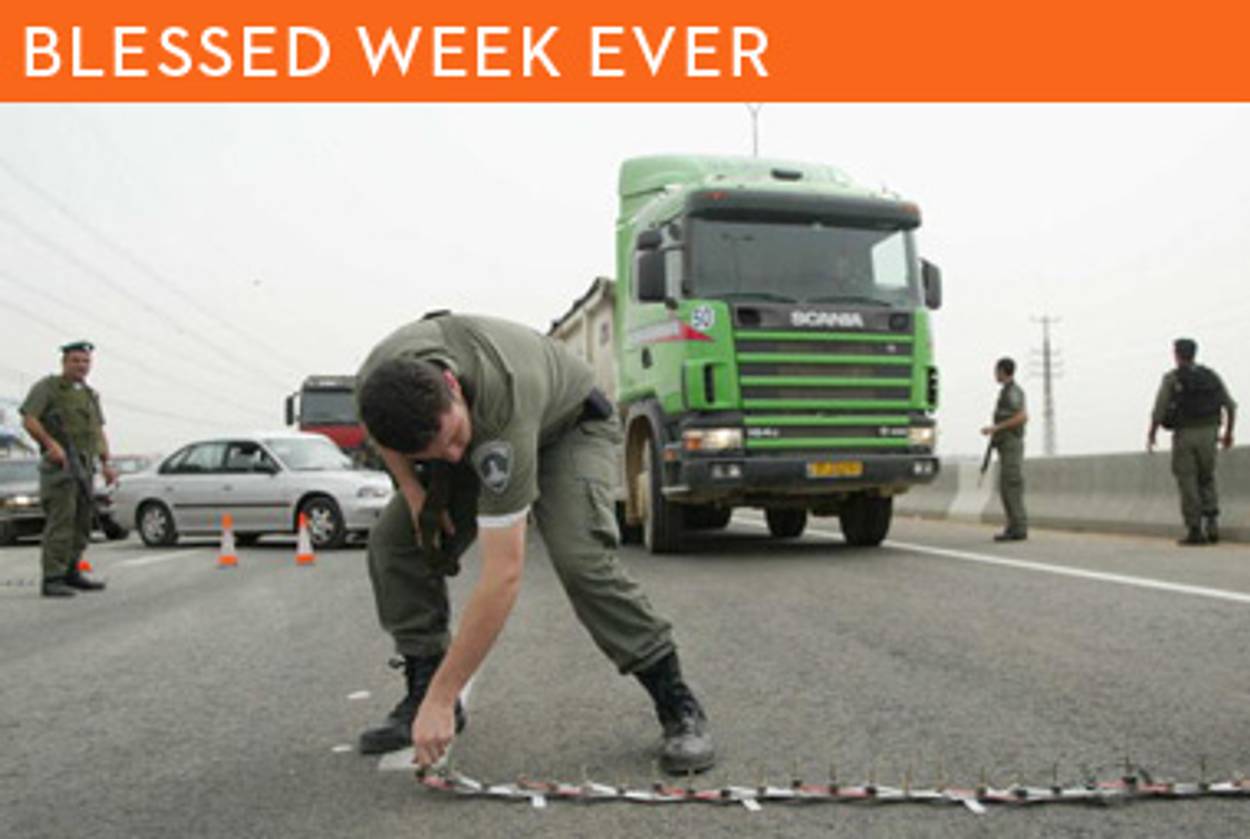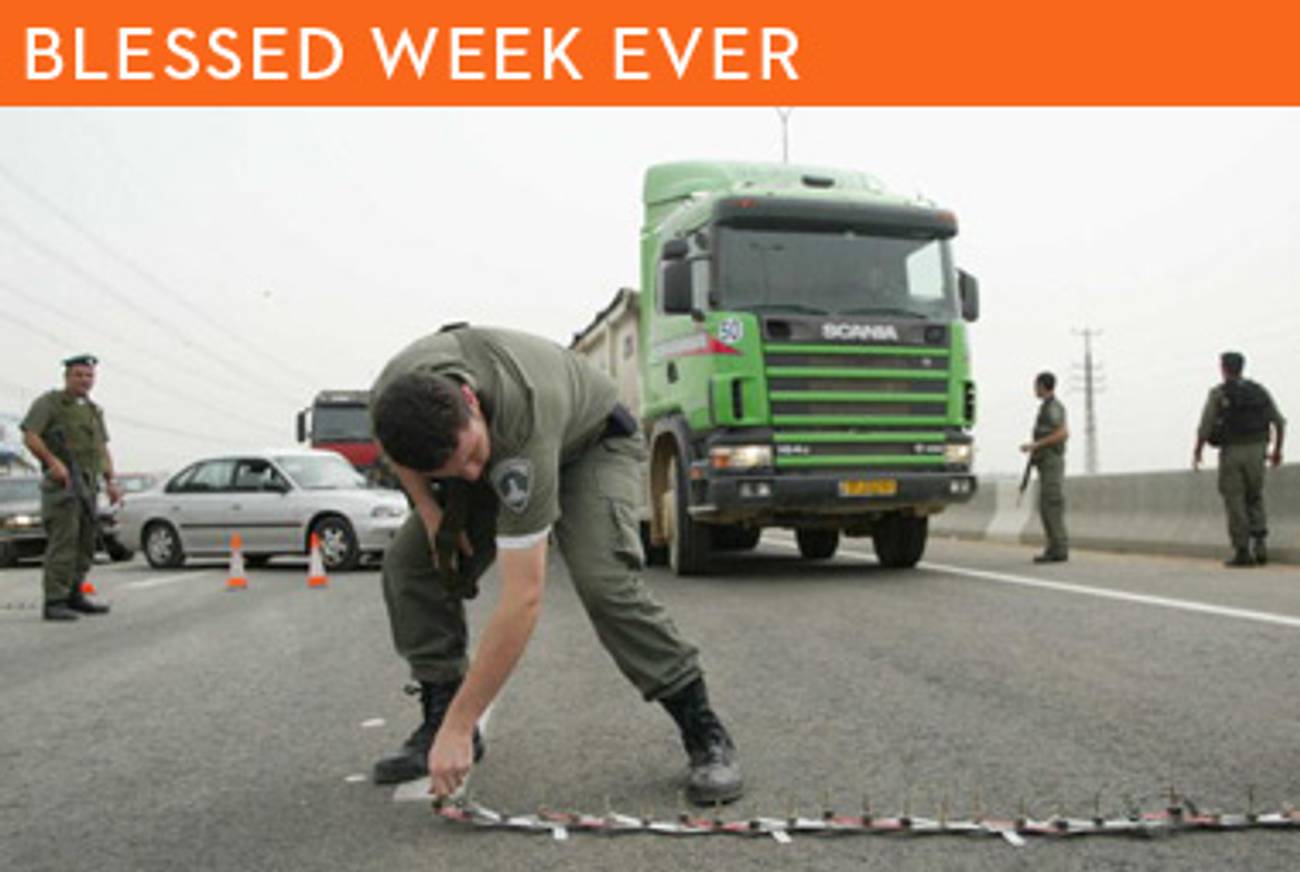The Road Less Traveled
A weekly haftorah of repression and regeneration




A few weeks ago, on the day I began a much needed winter vacation, I woke up, sat in front of my computer, and did my best to resist reading the news from Israel.
It’s become a morning routine for me, a former Israeli now a decade into a self-imposed exile in Manhattan: tumble out of bed, pull a double shot of espresso, tune into the latest from the Motherland, shiver with rage. But this was my vacation, and for a vacation to bestow its full rewards, one must first learn to ignore all those irritants that swirl above our daily lives like a cloud of noisy gnats, distracting and dispiriting us with their incessant hum. This morning, I told myself, this morning I’ll overcome the urge.
No such luck: man, as Albert Camus so poignantly noted, is the only creature who resists being what it is, even though resistance is largely futile. A few moments later, I was reading from right to left.
One article in particular caught my eye. It was about Maj. Gen. Amos Gilad, until recently the government’s West Bank coordinator and still one of the leading security officials in the country. Gilad was my former commander in the army, and I’ve come to respect his ability to consider every aspect of any given issue before passing judgment. Responding to accusations by Jewish settlers that a rabbi by the name of Meir Chai had been shot to death by Palestinian militants because the army opened a particular road to Palestinian traffic, Gilad, calm and confident, denied the settlers’ claims. He instead provided a reassuring statistic: the recent removal of numerous roadblocks in the West Bank, he said, contributed to an impressive boom in the Palestinian economy, which, in turn, led to a significant improvement in Israel’s overall security.
I sat at my kitchen table, coffee at hand, confused. For years, the stern men in charge of Israel’s security had been telling us laymen that roadblocks were practically inevitable, and that if we allowed Palestinians to travel freely between the villages and the towns of the West Bank—the gargantuan separation fence prevents them from getting anywhere near Israel itself—they’d waste little time abusing their newfound freedom and turn the roads into a bullet-ridden inferno. But here was Gilad—as much a representative of cautious, military-minded Israel as anyone else in the nation today—saying that quite the opposite was true, and that Chai’s murder aside, the Palestinians, finally free to move around without being subjected to lengthy, humiliating checkpoints and insurmountable closures, did what all other people would have done and raced to their offices, marketplaces, and anywhere else where the getting was good.
Why, then, had Israel persisted with its policy of rigid separation? If free traffic within the West Bank has been proven to revitalize commerce within a matter of months, why set up 99 permanent roadblocks in or around an area the size of Delaware, with an additional few dozen temporary roadblocks popping up unexpectedly each week? Why pursue a policy both cruel and ineffective?
The practical reason, of course, is that Palestinian access to roads is blocked because the settlers wish it so, yet another measure in their effort to make the biblical hills of Judea and Samaria an exclusively Jewish preserve. But there’s another answer, a more frightening one, and it involves this week’s biblical readings.
In the parasha, the Israelites, having thrived and multiplied in Egypt, are persecuted by the nefarious Pharaoh. Moses, their newly risen and still hesitant leader, has strong words with God. “O Lord!” he pleads angrily, “Why have you harmed this people? Why have you sent me? Since I have come to Pharaoh to speak in Your name, he has harmed this people, and You have not saved Your people.” But God is untroubled. “Now,” he says to Moses, “You will see what I will do to Pharaoh, for with a mighty hand he will send them out, and with a mighty hand he will drive them out of his land.”
So far, so good. As we are reminded each Passover, the Lord indeed keeps his promise, smites the Egyptians, and delivers his people. But read the haftorah, and things get a bit more complicated.
It’s a portion from Isaiah, the Jerusalem-born orator who preached at the time of the fall of the northern kingdom, the Kingdom of Israel. Looking at the catastrophe from his home in the Kingdom of Judah, Isaiah phrased his disdain for his sinful kin, now in exile, in roaring and beautiful verse: “Woe to the crown of pride of the drunkards of Ephraim,” he thundered, alluding to the Israelites, “and to the fading flower of his glorious beauty, which is on the head of the fat valley of them that are smitten down with wine!”
Not one to end things on a sour note, however, Isaiah delivers the following soothing promise. “Jacob,” he promised, “shall not now be ashamed, neither shall his face now wax pale; when he seeth his children, the work of My hands, in the midst of him, that they sanctify My name; yea, they shall sanctify the Holy One of Jacob, and shall stand in awe of the God of Israel.” Any enemy, he assures his listeners, any foe eager to annihilate the Chosen People, will suffer the Lord’s terrible swift sword.
More than 700 years, in all probability, had passed between Moses and Isaiah, and yet it seems as though not much has changed: in parasha and haftorah alike, God solemnly swears to redeem His people and crush their nemeses.
Comparing these two texts, a cynic might think that Jewish history is circular and silly, a cycle of empty promises conjured to meet the changing geopolitical needs of the day. But the truth is far more profound and profoundly disturbing: while God may or may not interfere on His people’s behalf, it is they who have the true power to both redeem and ravage themselves. If they are righteous and just, their kingdoms will thrive. If they pass their days drunk with wine or with wealth or with power, their kingdoms will crumble.
The Jews currently dwelling in Judea and Samaria would do well to take this lesson to heart. Reading this week’s haftorah, they might recall that there were once thriving Jewish kingdoms on the very same hills they occupy, and that these kingdoms perished not because they lacked might but because they were intoxicated with it, sacrificing their morality and piety alike on the altars of money and muscle and wine.
But the Jews currently dwelling in Judea and Samaria don’t seem to be paying much attention. A few days after Meir Chai’s murder, Israeli police officers blocked the road leading from Nablus to Tulkarem. Battered cabs carrying scores of Palestinians laborers were pulled to the side of the road and instructed to wait as settlers in newer cars with Israeli license plates careened through. There was no security-related reason for this imperious act: the settlers, en route to a memorial service for their slain friend, demanded to move about uninterrupted by the masses of Palestinians in whose midst they chose to live. The Kingdom of Israel has yet much to learn.
Liel Leibovitz is a senior writer for Tablet Magazine and a host of the Unorthodox podcast.
Liel Leibovitz is editor-at-large for Tablet Magazine and a host of its weekly culture podcast Unorthodox and daily Talmud podcast Take One. He is the editor of Zionism: The Tablet Guide.